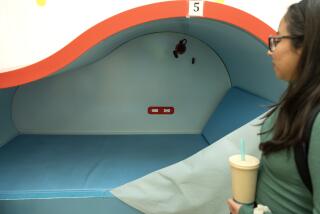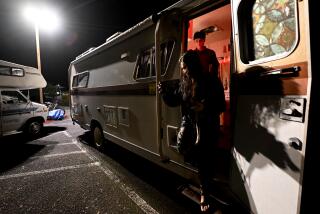Tulane’s ‘Semester Abroad’ Coming to an End
- Share via
BOSTON — Melissa Taylor said she had never heard the terms “last call” or “closing time” until she came to Boston from New Orleans, with its never-ending nightlife.
When Hurricane Katrina forced Tulane University to cancel its fall semester, Taylor found herself enrolled in what she and about 13,000 other Tulane students have come to think of as “our domestic semester abroad.”
They scattered to almost 600 colleges around the country. Most host schools accepted no tuition and did not ask to see transcripts. Boston University, where Taylor is spending the fall semester of her senior year, took in 320 Tulane students, more than any other institution.
The dispersal of Tulane’s entire student body -- along with 8,000 faculty members and other employees -- presented a challenge almost as great as refurbishing the campus, university President Scott Cowen said at a recent meeting for students now attending Boston-area colleges.
“Restoring the buildings, as it turned out, was the easiest part of the recovery story,” he said.
Cowen said he expected about 90% of Tulane’s undergraduates -- “the vast majority of our sophomore, junior and senior classes” -- to return when the school reopens in January. At least 80% of the freshman class, which spent just five hours on campus before the evacuation, is expected to come back, Cowen said. He also said the faculty, which is being paid while the university is closed, was likely to remain intact.
Even so, Cowen said, students and parents have been deluging him for months with questions about why they should return, given the level of destruction at the school and the city around it. Tulane had more than $100 million in property damage.
To quell those concerns, Cowen brought along a video with a soundtrack featuring a singer crooning: “Oh, what it means, New Orleans, I miss it each night and day.”
The university president also presented a progress report outlining how Tulane had responded to the largest natural disaster in U.S. history.
Freshman orientation was underway when the storm prompted an emergency evacuation that sent busloads of students to Texas and Mississippi. When the levees broke, New Orleans -- and Tulane -- was flooded.
Cowen, who had been camping out on an inflatable mattress in his office, recalled how “all of a sudden, I was on an island” -- without power, water, sewer services or communications.
While he relocated temporarily to Tulane’s interim headquarters in Houston, Cowen said, the school operated “on life-support systems.... I did not know whether we would ever survive.”
The university’s response in Katrina’s immediate aftermath was hampered by poor communications. Parents and others were furious, Cowen said, because school officials did not answer questions quickly. He explained: “The truth is, we could not.”
Gradually, a recovery plan took shape at Tulane -- the city’s largest employer, with a $1-billion annual budget. Within two weeks of the storm, construction crews were gutting the first floor of every structure inundated by up to 3 feet of water.
When New Orleans’ leaders announced that public schools would be shut for a year, leaving the children of Tulane faculty and staff members with no place to go, Cowen arranged to take over a nearby K-8 charter school. It will reopen in January for grades K-12.
Tulane officials insisted the new school be opened to neighborhood children and to the children of employees from Dillard, Xavier and Loyola universities. Dillard and Xavier, historically black institutions, were so badly damaged by Katrina that there was talk of moving from New Orleans or of shutting down entirely, Cowen said.
So Tulane offered to provide space on campus where Dillard and Xavier faculty can teach their students while their own institutions are repaired, Cowen said. Dillard and Xavier students also will be allowed to take Tulane classes on a space-available basis, Cowen said.
“We are doing for them what so many colleges and universities did for us -- which is, we are not charging them a dime,” he said.
Tulane students who had paid fall tuition will be reimbursed if their new schools also charged them, according to the university’s website.
Off-campus housing remains the largest obstacle at Tulane, Cowen said. More than 40% of undergraduates who lived on campus before Katrina will return to their dormitories. With large sections of New Orleans still uninhabitable, the demand for off-campus lodging is high, Cowen said.
As a short-term solution, the university has leased a cruise ship that will dock in New Orleans on Dec. 18. The Dream Princess will accommodate 1,000 people, with ballrooms and other spaces for classes -- but with bars and casinos closed.
The school also has bought and leased apartment buildings in the city, and constructed modular housing around campus. As a backup, Cowen said, Tulane can place students in hotel rooms.
But Cowen said the question he hears over and over is: What will it be like to come back to Tulane and New Orleans?
“It will be like being in a small to medium college town in a Peace Corps environment,” he said, speaking directly to the students in Tulane gear.
“You want to be part of the largest recovery effort in U.S. history, you come back,” he told them. “Education is not just what happens in the classroom. You want an education in life, you come back.”
After his speech, students peppered Cowen with questions about what had happened to their belongings. He assured them it was all safe, and probably back in the dorm rooms where they had left it. Parents and alumni asked about the private school’s financial stability. Cowen suggested they write large checks, immediately.
Like many other displaced Tulane students, Taylor said she was grateful to Boston University for taking her in. In return, she said, anyone from BU would “forever have a couch to crash on” during Mardi Gras.
But “Boston and New Orleans are very different cities,” she said. Compared with the Big Easy, she said, Boston’s night life leaves much to be desired. And as for the weather: “I’m still struggling with the concept of people willingly living where there is winter,” said Taylor, who arrived with a duffel bag full of shorts and swimsuits.
Boston University President Robert A. Brown said students and faculty at his school had gained “a sense of satisfaction” from accommodating the Tulane refugees.
“We took these kids in with no screening, no fussing,” he said. “We just opened our classrooms.”
Brown said the one thing BU had not provided was “a decent snowstorm.” He smiled and added: “There is still time.”
More to Read
Sign up for Essential California
The most important California stories and recommendations in your inbox every morning.
You may occasionally receive promotional content from the Los Angeles Times.













